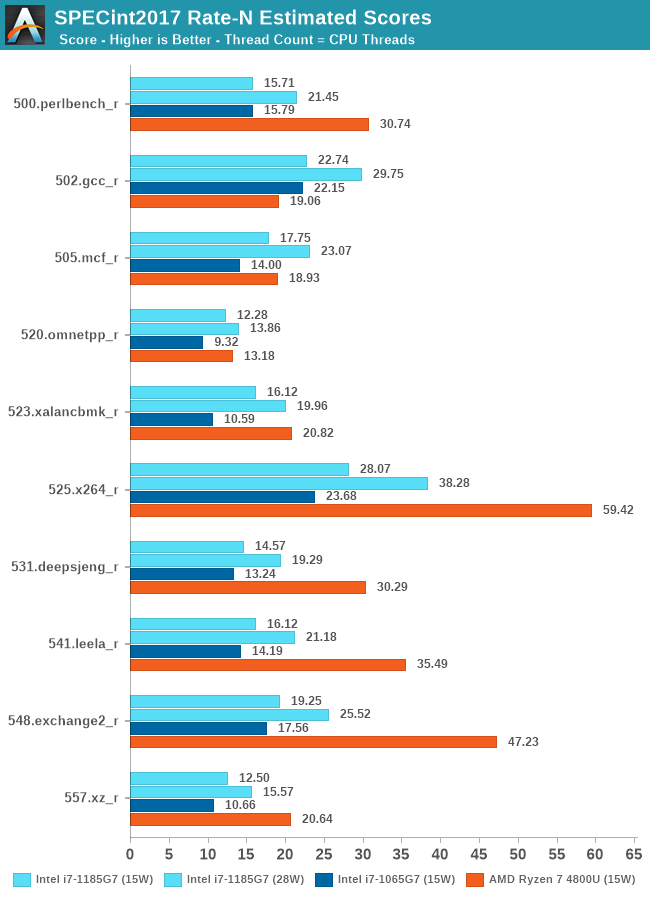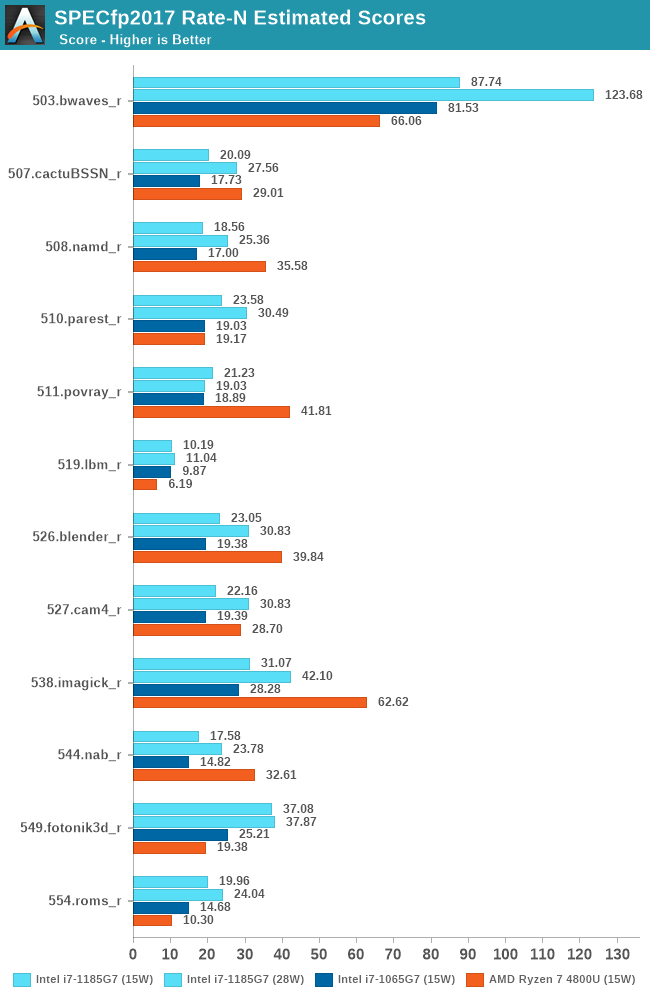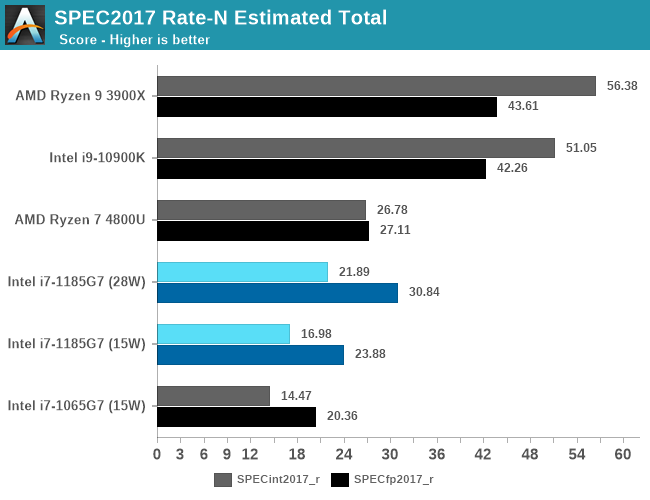Intel’s Tiger Lake 11th Gen Core i7-1185G7 Review and Deep Dive: Baskin’ for the Exotic
by Dr. Ian Cutress & Andrei Frumusanu on September 17, 2020 9:35 AM EST- Posted in
- CPUs
- Intel
- 10nm
- Tiger Lake
- Xe-LP
- Willow Cove
- SuperFin
- 11th Gen
- i7-1185G7
- Tiger King
Section by Andrei Frumusanu
CPU MT Performance: SPEC 2006, SPEC 2017
We’ve noted the earlier discussions of Intel’s TDP handling and how Tiger Lake has 15W and 28W operating modes, and where this comes into play the most is in multi-threaded scenarios where the platform is generally power envelope limited, having to otherwise clock down.
We’re showcasing the MT performance in SPEC for both the Tiger Lake modes, comparing it to both the 15W Ice Lake and AMD Renoir chips. As a note, the 15W Ice Lake platform had a sustained power draw of 18W which makes things not quite as apples-to-apples. Also as a reminder, the Intel systems have 4 cores and are running 8 thread instances, while the AMD system has 8 cores and is running 16 threads.

At first glance, the Tiger Lake system performs quite well versus its predecessor, but that’s mostly only in the 28W mode. At 15W, the generational boost, while it is there, isn’t that significant. This might point out that efficiency isn’t all that much better this generation.
AMD’s platform scales incredibly well in execution-bound workloads as it fully takes advantage of double the core count. In more memory-heavy workloads, the Zen2 cores here seem to be lacking sufficient resources and scale below the performance of Intel’s 4-core designs in some workloads.

In the floating-point results, it’s again a matter of TDP headroom as well as memory performance scalability. In the 15W results, the Tiger Lake chip posts rather small improvements over its Ice Lake counterpart, whilst in the 28W mode the gains are more considerable and even manages to outperform the AMD system more often than not.

In the overall scores, the verdict on Tiger Lake is dependent on how you evaluate Intel’s performance gains. At an (semi)equal-TDP level between Tiger Lake and Ice Lake, the improvements in performance are 17%. Intel does reach a larger 51% generational performance boost in its 28W configuration, but at that point we’re talking about quite different cooling solutions inside of a laptop, no longer making this a valid apples-to-apples comparison.
We haven’t had opportunity to test out higher TDP -HS model of Renoir yet, but with the 15W 4800U already mostly tied with the 28W i7-1185G7, we would expect it to notably outperform the Tiger Lake chip.
Overall, Tiger Lake seems to be offering roughly 20% better performance per watt over its predecessor, with increased performance beyond that coming at a cost of higher power consumption.










253 Comments
View All Comments
Rtx dude - Monday, September 28, 2020 - link
Thank youStingkyMakarel - Friday, September 18, 2020 - link
anyone tried running multiple single threaded app on Intel and AMD?dsplover - Friday, September 18, 2020 - link
Yes. A couple actually which each get a Core assignment. I’m an audio geek that came from using a PC for streaming from HDD’s (Seagate 10k SCSI Cheetahs) to a software based synthesizer enthusiast where single core performance is crucial.Started with AMD MPs/Tyan Tiger and Coppermine 1GHz CPU’s.
I’ve concluded that CPU Cache or 4.4GHz on an Intel is optimal.
Latency from extra cores causes me to adjust audio buffer sizes to compensate which I noticed on the Intel Quads. Conroe Dual Cores were faster for my core locked synths. A larger CPU cache overcame the inefficiencies when i7 Bloomdales hit the market.
Matisse 3800X was a great chip, but more than the 8 Cores was the same latency issues.
Looking forward to the Cezanne and maybe a Vermeer as I don’t need killer graphics, 2D is fine. Actually AST ASpeed 2500 Server chips on Supermicro and ASRock workstation/server boards is fine.
What I seek is the single core performance crown. Intel i7 4790k’s are still in my racks. To make me jump to new builds is a larger cache from Intel. Tiger Lake at 50watts looks great for my needs. 4.4GHz is as good as it gets. But even my ancient i7 5775C using a discrete GFX card, using the 128MB L4 cache for audio (running at 3.3GHz) was on par with the 4GHz 4790k.
So for me the CPU/IPC gains are appreciated, but cache and CPU running at 4+ GHz are really beneficial.
Tiger Lake or Cezanne will finally show me the results I need to upgrade.
Intel and AMD can add all of the Cores they want. Single core performance or larger cache to overcome the latency of additional Cores will mean I can run more high end Filters to shape my sounds with.
dromoxen - Saturday, September 19, 2020 - link
For me these are still too weak GFx despite 2x .. When they can match or better my gtx960 they might have a customer. Otherwise I''ll stick to a downclocked ryzen 4000+gtx960 ..I want low low heat output , and a single APU would be ideal ..ASROCK deskmini styleee .Gondalf - Friday, September 18, 2020 - link
Not only but the claimed 10/15% IPC boost of Zen 3 will be barely enough to be near with Intel clock to clock. Still Intel process clock clearly better, so the upcoming 8 cores Tiger Lake will be an easy winner over an eight core Zen 3.To be noticed, in productive benches Intel core destroy badly Zen. Likely the cache structure is done to perform great on standard laptop SW.
As usual a core have to be SW optimized, definitively not synthetic benches optimized. More or less the reason Xeon is right now a big winner on Epyc in the 32 cores/cpu market (the larger).
Spunjji - Friday, September 18, 2020 - link
You say this every time a new AMD processor is due, and every time you're wrong, and the next time you say the same damned things again. 😑close - Friday, September 18, 2020 - link
Subjective opinion time. Ian & Andrei, leaving aside individual scores (great ST performance for Intel, great MT performance for AMD), which one would you buy for day to day "regular" work?I've read opinions like "I made it painfully clear that the top-of-the-line Intel CPU at its highest cTDP was only going up against a mid-grade Ryzen" and there's still room for personal opinion here. Should you have to buy one now "money no issue" and ignoring specialized fields (like AI stuff where AVX-512 makes sense) which would you put your money on?
Spunjji - Friday, September 18, 2020 - link
I look forwards to the day when this Intel shill troll gets banned.melgross - Sunday, September 20, 2020 - link
Oh, come on. We have both AMD and Intel trolls here. They cancel out.Spunjji - Sunday, September 20, 2020 - link
There's being a fanboy, then there's creating an entire alter ego as some desperate attempt at satire that is inherently self-satirizing of the person running the account. I find this one deeply tiresome.